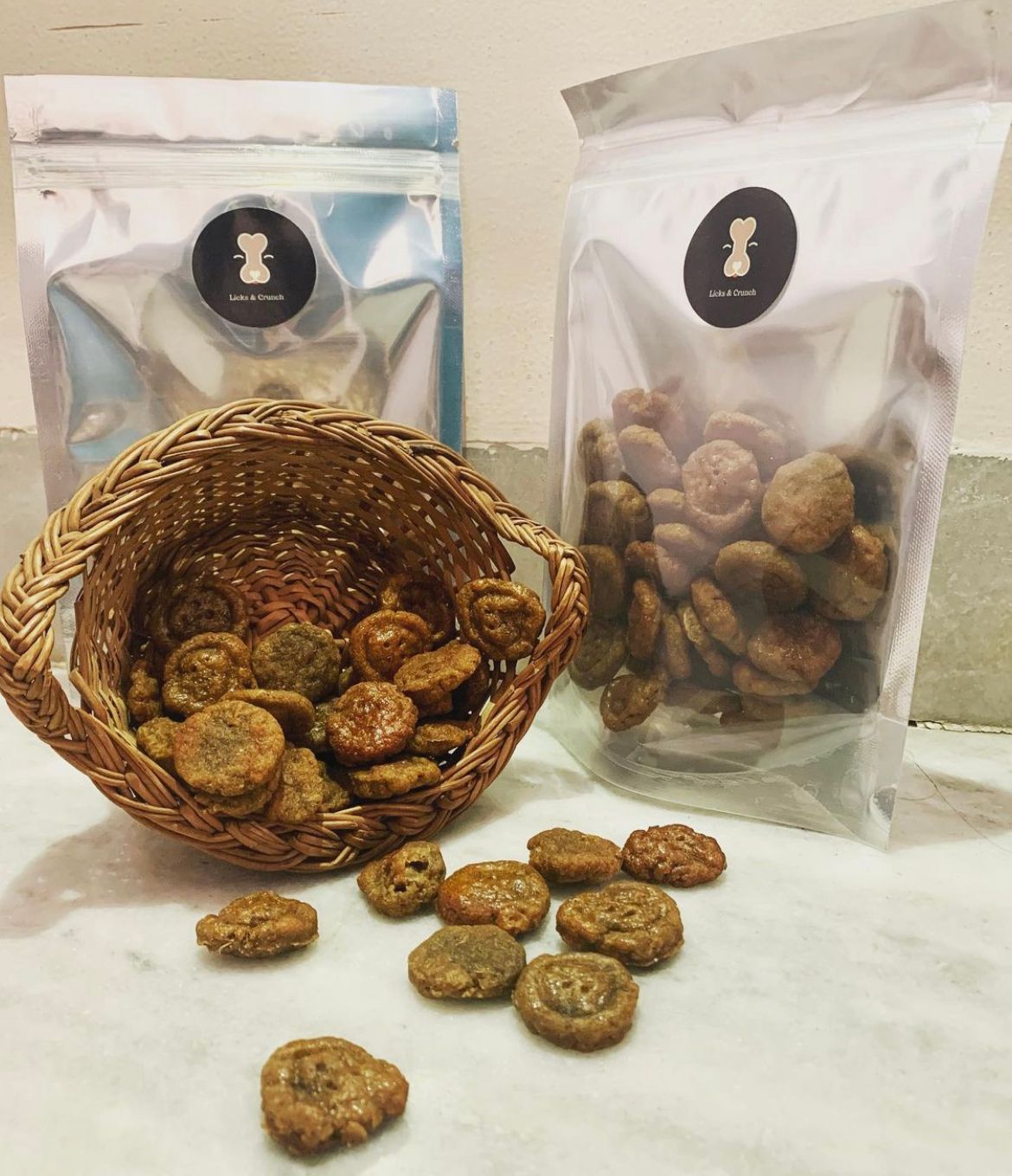Surbhi Hablani has the best target audience in the world — dogs. And you’d think they’d be an easy group to cater to, but the truth, in fact, is quite the opposite.
In fact, she says she has a cohort of very judgemental, very hard-to-please quality testers who have extremely high standards — 90 street dogs outside her home in Indore, Madhya Pradesh, who she regularly tests out her products on (and this is the ONLY animal testing we’re willing to get behind).
A biomechanical engineer who moved back home from the US just before the pandemic hit, Surbhi is the Co-founder and CEO of Licks & Crunch, an Instagram-based dog food startup that makes innovative and delectable species-appropriate treats. She runs the operation out of her own kitchen at home, along with her mother and co-founder, Ritu Hablani.
What sets Licks & Crunch apart from others in the space is their innovative recipes which — apart from being species-appropriate and using carefully researched ingredients — use herbs and Indian spices to provide some medicinal value to the treats.

Just like Indian cuisine that employs the use of a variety of spices and herbs to not only make food delicious, but also nutritious, Surbhi says the idea at Licks & Crunch was to create something that could heal, as well as satiate.
“I stumbled upon the idea when one of the street dogs I used to feed during the pandemic gave birth to a litter, and one of the puppies fell extremely sick. I took the puppy to the vet, and he kept pushing kibble on me after prescribing medication, instead of educating me on natural foods I could use to make her better,” Surbhi tells YourStory.
After doing some independent research, she realised that there were some small businesses in India catering to holistic pet nutrition — and it soon became clear to her that she wanted to be involved in the space too, and not just as a consumer.
Licks & Crunch currently does business on Instagram, where pet treat menus are released every month, with special treats, across various flavour profiles. Its hemp line has been quite popular with pet parents who have woken up to the many ways in which the plant can help their dogs, especially with age-related issues such as arthritis, as well as medical conditions such as epilepsy (although the latter requires a specific diet too).
Surbhi says the business has been growing steadily since it launched in November 2020. Orders average at around 50-55, per day, and the cart value is around Rs 1,100 to Rs 2,000. Sales during the lockdown months saw a spike as more people started more time online and stumbled upon the concept of “species-appropriate” feeding on social media.

All of the money invested in the business, so far, has come from Surbhi’s personal savings. She’s next focused on launching her website soon, adding novelty meats-based treats to the product line, and getting all her products lab-tested so she could start putting nutritional panels on them.
Surbhi says she’s also planning to do a friends and family round of funding soon so she can expand the business.
Packaged dog food, including kibble, has been proven to do more harm than good to animals, various clinical studies have shown. In fact, there’s a documentary on YouTube called ‘Pet Fooled’ that talks about how roadkill, dead and decaying carcasses of animals, and even filler grains such as cornhusk etc are used to make pet food, and how that has caused the death of beloved pets, worldwide.
In India, there has been a rise in the number of startups and small brands making species-appropriate pet food, treats, and chews in recent times. India’s biggest pet brand, , in fact, started its own line of preservative-free dehydrated meats, taking cues from more conscious pet parents in India who are actively trading in unnatural treats for natural ones.
, House of Canis, Magic Paws Co, Canine Craving, and Georgina’s Kitchen, among many others, are some small businesses creating a big impact when it comes to pet health and nutrition in India. All of these small businesses sell pet treats, food and treats that locally source their meats and ingredients, and contain zero harmful chemicals or ingredients that could irritate or harm them.
The pet food industry, which includes kibble, jerkies, canned foods, and treats, is a $38.6 billion industry dominated by giant companies that own multiple brands under one umbrella organisation. These behemoths, much like the pharmaceutical industry, fund and operate thousands of pet clinics all over the world where veterinarians are given incentives when they help these brands sell.
But homemade, animal-conscious, quality controlled, and species-appropriate treats and food are fast becoming the norm with pet parents, worldwide.
Edited by Teja Lele Desai


